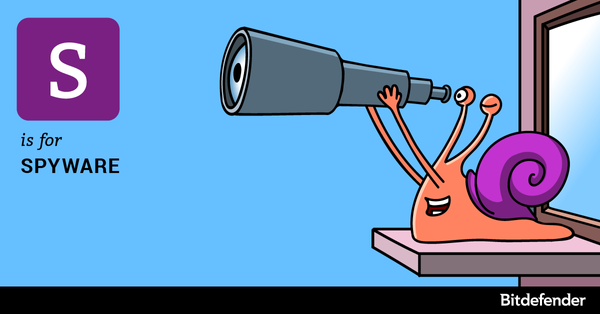The ABC of Cybersecurity: S is for Spyware

What if a hacker had front row tickets to your bedroom every evening through your laptop’s webcam? Or maybe a stranger was listening in through your microphone while in a confidential business meeting? This is now possible due to malicious software called spyware.
What is spyware and how does it work?
Without your approval, hackers use spyware to collect information about all your computer and internet activity, which could then be sent to third parties for some extra bucks and extortion. In a matter of seconds, a criminal has access to your credit card information, bank transactions, name, address and passwords, and can easily manipulate your entire system by accessing your webcam, microphone and other functionalities.
PCs are not the only devices exposed to these threats. Since we”ve moved our lives on mobile, hackers can use spyware to track our location through GPS, read our conversations and even record them.
And there”s not much you can do about it. In recent years spyware has proven a complex enemy, difficult to detect and get rid of even by professional anti-spyware solutions. A silent and difficult to detect observer, it installs by itself when users surf the web using a vulnerable browser, when they install a rogue program which seems legit or when downloading music or movies from suspicious file sharing sources.
Who uses spyware and why?
Keystroke logging is one of the common types of spyware. Also known as key loggers, it records each keyboard stroke to steal your passwords and other information you”ve typed. Now, how many times have you used that free USB stick received at some random event? Better think twice next time because it could be a USB key logger.
In other cases, spyware is installed on purpose on shared or public networks by their owner for better activity surveillance to prevent breaches. Besides enterprises interested in monitoring their employees, governments around the world use or write their own spyware software to hijack potential national security threats and fight terrorism.
The latter use of spyware is susceptible to debate, after human rights organization Amnesty International spoke out in 2015 against governments going down this road to spy on journalists and human rights activists, among others, claiming it”s an attack on free speech.
Although irritating, not all spyware software is used with malicious intent. Some legitimate programs or social media channels like Facebook come bundled with spyware which we unknowingly accept and allow to track our activity for user profile analysis and advertising.
How to detect a spy infiltrated in your network
It”s not always handy to expose malicious software but there are some key features you can pay attention to. If you notice browser or software changes that you don”t remember authorizing, if your computer is slow and even crashing often or if you have disk usage problems, then you might be dealing with spyware. Since these are signs for other issues as well, run an anti-spyware scan immediately but bear in mind that some spyware can be very aggressive and difficult to get rid of and even detect.
As always, the user is the most important factor, while a negligent one is the number one cause of security breaches. Make sure you always update your operating system, your security software and anti-spyware solution, as well as your web browser. Be on the lookout for suspicious icons which could suddenly appear in your task bar, keep an open eye for fake software available for download and never click on pop-up ads.
tags
Author

The meaning of Bitdefender’s mascot, the Dacian Draco, a symbol that depicts a mythical animal with a wolf’s head and a dragon’s body, is “to watch” and to “guard with a sharp eye.”
View all postsRight now Top posts
Start Cyber Resilience and Don’t Be an April Fool This Spring and Beyond
April 01, 2024
Spam trends of the week: Cybercrooks phish for QuickBooks, American Express and banking accounts
November 28, 2023
FOLLOW US ON SOCIAL MEDIA
You might also like
Bookmarks









